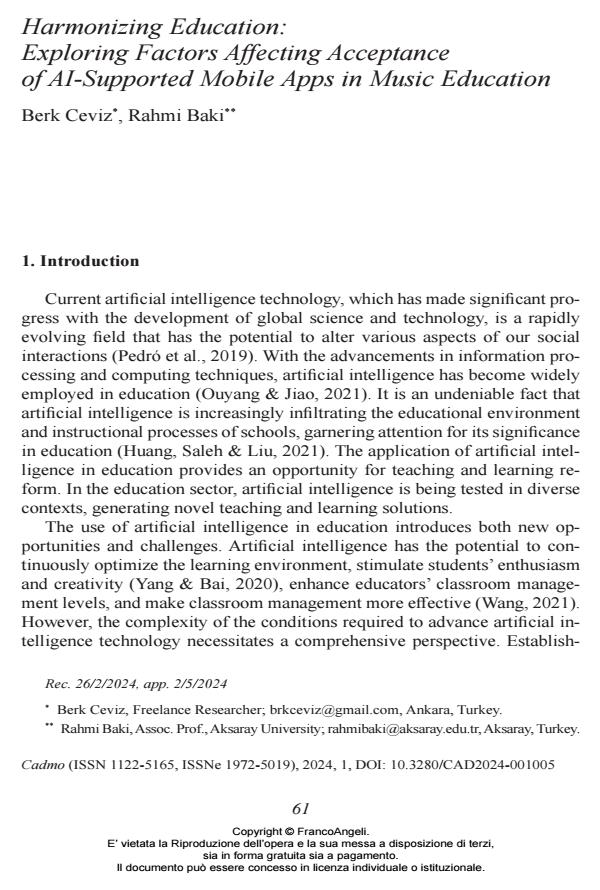Harmonizing Education: Exploring Factors Affecting Acceptance of AI-Supported Mobile Apps in Music Education
Titolo Rivista CADMO
Autori/Curatori Berk Ceviz, Rahmi Baki
Anno di pubblicazione 2024 Fascicolo 2024/1
Lingua Inglese Numero pagine 25 P. 61-85 Dimensione file 241 KB
DOI 10.3280/CAD2024-001005
Il DOI è il codice a barre della proprietà intellettuale: per saperne di più
clicca qui
Qui sotto puoi vedere in anteprima la prima pagina di questo articolo.
Se questo articolo ti interessa, lo puoi acquistare (e scaricare in formato pdf) seguendo le facili indicazioni per acquistare il download credit. Acquista Download Credits per scaricare questo Articolo in formato PDF

FrancoAngeli è membro della Publishers International Linking Association, Inc (PILA), associazione indipendente e non profit per facilitare (attraverso i servizi tecnologici implementati da CrossRef.org) l’accesso degli studiosi ai contenuti digitali nelle pubblicazioni professionali e scientifiche.
Preferring artificial intelligence-supported applications in music education is crucial for ensuring sustainability. These applications can provide students with a more effective and personalized learning experience by delivering content tailored to their needs and promoting efficient resource utilization in music education. Artificial intelligence (AI) technology, which has recently experienced significant advancements, is now being incorporated into various aspects of life, including education. Mobile education applications (MEA), synthesizing all the qualities of modern education, are now benefiting from AI technology. This study aims to present a comprehensive framework that identifies the factors influencing the acceptance of Artificial Intelligence Supported Mobile Education Applications (AISMEA) to establish an AI ecosystem contributing to sustainable development. To achieve this goal, the explanatory power of six independent variables (Perceived Usefulness, Perceived Ease of Use, Social Influence, Trust, Facilitating Conditions, and Design) on the intention to use AISMEA was investigated. Within the scope of the research, 407 students enrolled in a private educational institution were instructed to use one of three AISMEAs providing services in different areas of music education (piano instruction, classical guitar instruction, and music theory instruction). Subsequently, they were asked to share their experiences. The collected data were analyzed using a two-stage approach, revealing that Perceived Usefulness, Trust, and Design variables had a positive and significant impact on the intention to use AISMEA. The theoretical and managerial findings derived from this study are expected to contribute to researchers, educational institutions, and system developers.
Parole chiave:Artificial Intelligence, Sustainable Education, Mobile Education Applications, Technology Adoption, Instrumental Education, Music Theory Instruction.
Berk Ceviz, Rahmi Baki, Harmonizing Education: Exploring Factors Affecting Acceptance of AI-Supported Mobile Apps in Music Education in "CADMO" 1/2024, pp 61-85, DOI: 10.3280/CAD2024-001005